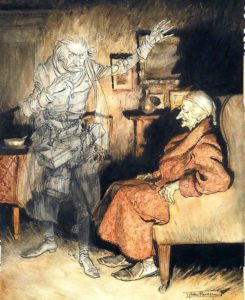“For he who sows to his flesh will of the flesh reap corruption, but he who sows to the Spirit will of the Spirit reap everlasting life” (Galatians 6:8)
We can illustrate Galatians 6:8 with the imagery of a great feast, But unlike the usual depiction of a feast, this will not be a feast of eating and drinking- this feast will be a feast of consequences. (1)
You see, Galatians 6:8 tells us that every human being will eventually be served with his or her own feast of consequences. Each unique feast will be created by the choices we’ve made throughout our lives. In fact, everyone is working now to prepare this feast. We are preparing our ingredients, setting our table, and arranging our seats for this banquet.
The latter portion of Galatians 6:8 describes one such feast: “…those who live to please the Spirit will harvest everlasting life from the Spirit” (NLT). The alternative is described in this passage as well: “Those who live only to satisfy their own sinful nature will harvest decay and death from that sinful nature…” (NLT). Everyone is ordering his or her feast of consequences from one of these two menus.
 We can also turn to the fictional classic, A Christmas Carol to illustrate this idea. This famous tale revolves around a stingy, tightfisted businessman named Ebenezer Scrooge who was visited by the ghost of Jacob Marley, his former business partner. Like Scrooge, Marley had been selfishly preoccupied with the accumulation of wealth during his life. That choice led to terrible consequences, for Marley was condemned to walk the earth while chained with money-boxes, padlocks, and financial records following his death.
We can also turn to the fictional classic, A Christmas Carol to illustrate this idea. This famous tale revolves around a stingy, tightfisted businessman named Ebenezer Scrooge who was visited by the ghost of Jacob Marley, his former business partner. Like Scrooge, Marley had been selfishly preoccupied with the accumulation of wealth during his life. That choice led to terrible consequences, for Marley was condemned to walk the earth while chained with money-boxes, padlocks, and financial records following his death.
Seven years after his passing, Marley’s ghost was permitted to visit Scrooge to warn him to change his selfish ways. In the course of their conversation, Scrooge asked Marley to explain why he was chained. Marley responded with this anguished reply…
“I wear the chain I forged in life… I made it link by link, and yard by yard; I girded it on of my own free will, and of my own free will I wore it …no space of regret can make amends for one life’s opportunity misused! Yet such was I! Oh! such was I!”
So Marley’s selfishness became a chain that haunted him following his death. Now admittedly, A Christmas Carol is not a Biblical account, but the author was right in one sense: like Jacob Marley, the choices we make today will result in the consequences we will face later.
(1) The image of a “banquet of consequences” has been attributed (although perhaps inaccurately) to Scottish writer and poet Robert Louis Stevenson.
Image credit: Scrooge and the Ghost of Marley Arthur Rackham [Public domain] https://commons.wikimedia.org/wiki/File:%27Scrooge_and_the_Ghost_of_Marley%27_by_Arthur_Rackham.jpg

